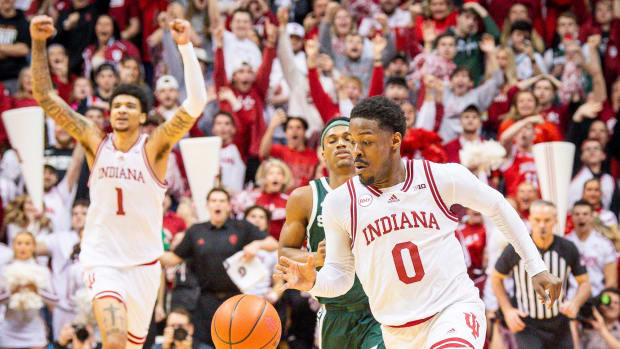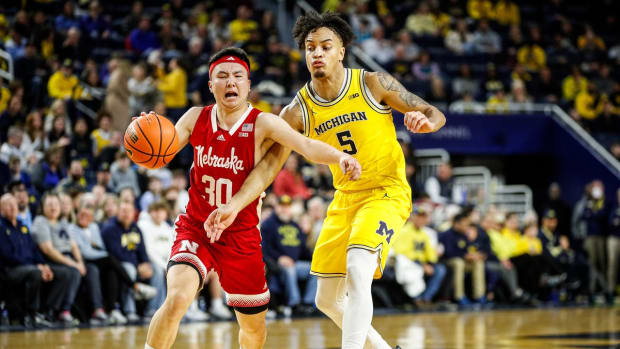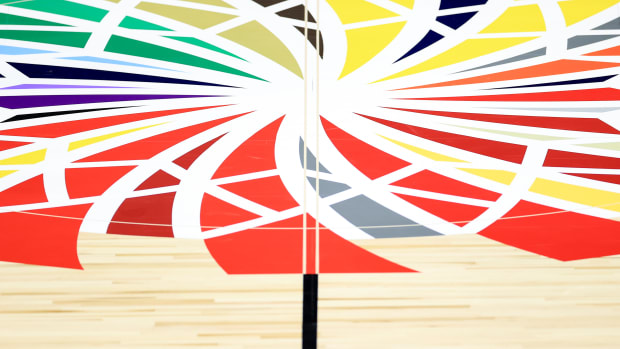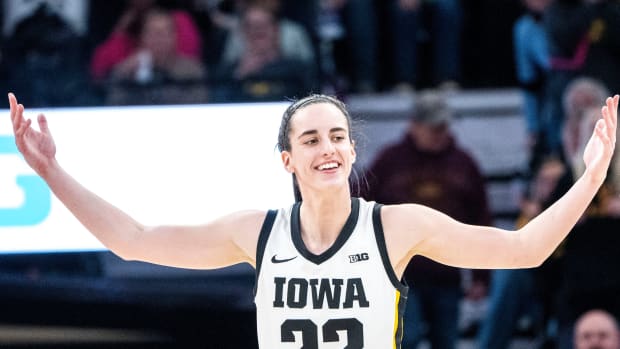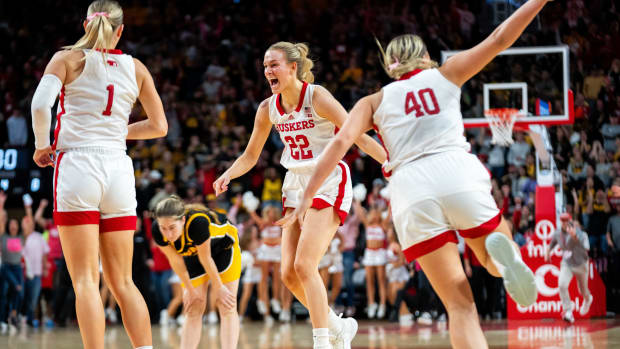Talking Points: Michigan Basketball Pre- & Post-Op Of A Tough Loss To Oregon
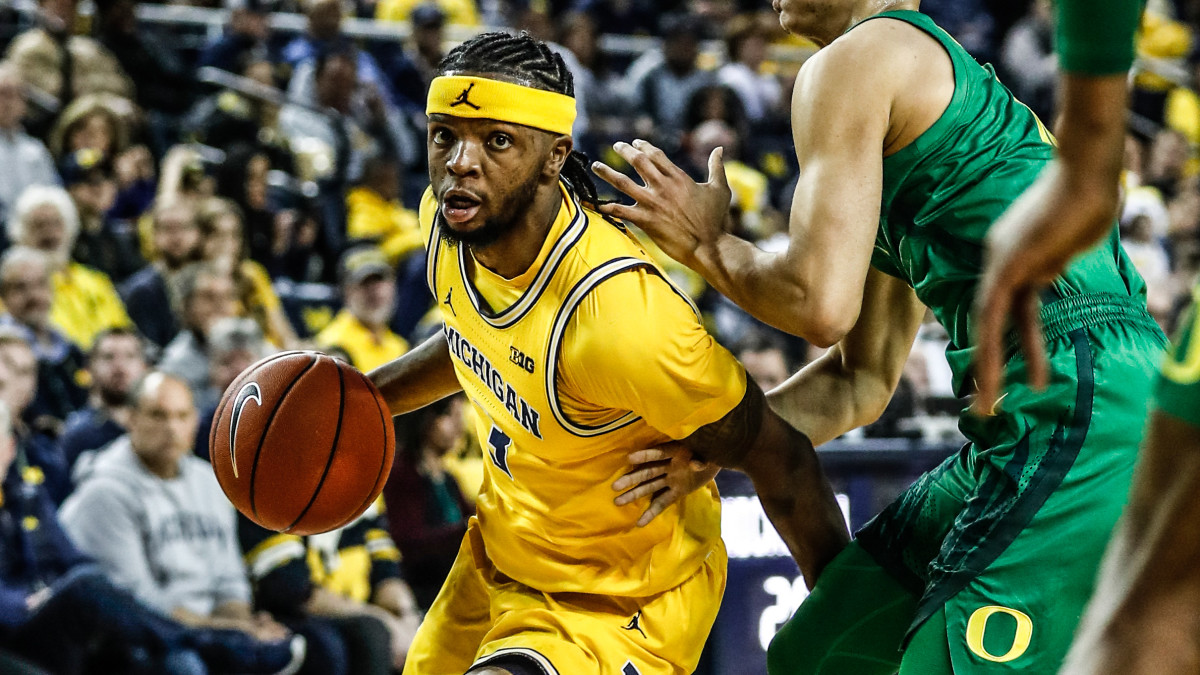
With 19 years of experiencing battling in the paint as an NBA player on his resume, Michigan head coach Juwan Howard should be no stranger to what it takes to succeed, or at least survive, in the low post. Add in the fact that he has a seasoned senior like Jon Teske at his disposable at the center position, it as a reasonable expectation for the Wolverines be at least adequate in the low post this season.
It its first taste of conference play, in which U-M was steamrolled in the post by a combined tally of 100- 64. The disparity was there on the offensive glass as well, with the Maize and Blue being outrebounded by a total of 30-18 on the offensive glass and outscore 43-13 on second-chance points.
“We talked about how we can’t allow that many points in the paint and, defensively, what we have to do better to prevent something like that from happening,” Howard said when asked about these issues in the paint. “Unfortunately for us, when we give up that many points in the paint, as well as 15 offensive rebounds, it’s going to be challenging for us to win a ballgame.”
“When the ball goes up, we’ve got to locate a guy and box him out and pursue the basketball. Another thing is, we’ve got to do a better job of keeping our guys in front of us, shrinking the floor and not allowing direct blow-bies."
While UO was without the services of their leading rebounder in fifth-year senior Shakur Juiston because of injury and don't employ a player taller than 6-9 in their rotation, it presented a different kind of challenge for Michigan's rim protectors.
The Wolverines did limit Oregon's post players to 11 points, but the Ducks' guard-oriented offense was able to compensate for their lack of traditional post production. Led by senior point guard Payton Pritchard's 16 points on 8 of 8 shooting (100%) in the paint, UO outscored U-M 28-26 in the paint. While not as severe as the thrashing by the Hawkeyes and the Illini in Michigan's two previous games, this slim differential proved monumental in a one-point overtime loss.
After missing three dunks in the first half, the Wolverines were able to take advantage of the diminutive Ducks in the second half and overtime, making 7 of 8 shot attempts down low (87.5 percent), but continued to struggle on the offensive glass. Against an Oregon team that ranks 316th in the country in Defensive Rebound Percentage (DR%) at 77.3, according to KenPom advanced statistics, the Maize and Blue managed 10 offensive rebounds on 27 missed shots. The resulting 27.8 Offensive Rebound Percentage (OR%) is below the national average this season.
While much has been made against its shooting woes in losses this year, Michigan’s struggles in the post should be just as, if not more, concerning as it prepares for league play in a Big Ten that boasts eight teams in the top 50 in the country in OR% and five in DR%.
Howard on the stunning contrast between Michigan shooting efficiency at home and on the road:
“Those numbers are staggering. The last two road games we had, we didn’t shoot well. It can’t become a mental problem, we have to just stay the course and know and trust ourselves and one another.
“I think if we did a better job of moving the basketball, I think a lot of the shots would have been a lot easier shots for us. At times, it was just too many one-pass and shot, or there was an opportunity where we just went to an isolation and there was no spacing.”
Freshman forward Franz Wagner drained a three-pointer on Michigan’s first shot attempt of the game, providing momentary hope that the pattern of the Wolverines shooting lights out at home would continue. That hope waned over the next 16:28 minutes of action as U-M missed its next eight shots from beyond the arc and fell behind as many as 16 points in the first half. In the first 20 minutes, the Maize and Blue shot just 7 of 29 from the field (24.1%) and 3 of 13 from three (23.1%).
After a similarly abysmal three-point shooting performance in the first half against Illinois earlier in the week, Michigan lost trust in its tree-shooting, attempting only six shot from downtown. In its loss to the Ducks, the Wolverines once again shot the ball only six times from beyond the arc over the last 20 minutes and overtime, hitting five (83.3%), but it was less due to lack of trust and more a result of taking what the Ducks left open.
Michigan shot 65.2% in the second half, including 87.5% in the paint, and assisted on 9 of 15 made field goals (60%). In losses to Louisville and Illinois, the Wolverines averaged three assists per 20 minutes, did not log more than six assists in a single half and assisted on 40% of total made baskets.
Howard on Oregon senior point guard Payton Pritchard:
“Oh man, he’s one of the best point guards in the country. I watched him last year when i was working for the Miami Heat and I was impressed by his game and became a fan just because of his toughness.
“When the game is on the line, he wants the ball in his hands. He's shown that he can do special things for himself and as far as for the team, making great decisions with the ball to create scoring opportunities for his teammates, he’s definitely the head of the snake.”
Howard’s assessment of Pritchard proved more prophetic than he probably would have liked, with the senior floor general taking the game over in the last 15 minutes and single-handily willing the Ducks to victory. Michigan had no answers for the senior floor general as he scored 15 of the Ducks’ final 17 points on 7 of 8 shooting (87.5%) during the final 10 minutes of regulation and overtime.
In a victory over Iowa earlier in the season, Michigan was torched by UI junior center Luka Garza for 44 points, but it was later revealed that this was part of a larger plan—let Garza get his and shut the rest of the Hawkeyes down. They did, and it worked. Pritchard’s takeover was zero-parts strategy, however, senior point guard Zavier Simpson and the Wolverines simply couldn’t figure out a way to slow him down when it mattered most.
Howard on freshman forward Franz Wagner, the pressure he puts on himself and if he’s pressing too much:
“He is his worst critic, and that’s what makes him so great. I just want to make sure that he doesn’t beat himself up too much because it’s gonna happen. In the last game, he felt he could have had a better game. Some shots did not fall for him. Two threes in a row, I love those threes that he took. It’s going to go down and I trust him. Does he beat himself up? Yes he does, but no, he’s not pressing.”
It was clear that the highly-lauded freshman wasn’t pressing against the Ducks, and finally found his shooting stroke, scoring 21 points on 8 of 13 shooting (61.5%), including 4 of 7 (57.1%) from beyond the arc. In his best game since returning from injury, it was the type of performance that could make U-M a potential threat for the conference crown. Unfortunately, Howard and his squad still have to go on the road nine more times this year, with a 10th at Madison Square Garden against Rutgers in what is technically considered a neutral site game.
Much like the Wolverines as a whole, Wagner has been a different player at home than on the road this season. Perhaps he isn’t pressing and it’s just bad basketball luck in a small four-game sample size, but the difference is tangible. In home contests, he is averaging 19.5 points, a 144 Offensive Rating (ORtg) and a 63.0 Effective Field Goal Percentage (eFG%). On the road, he is scoring only 4.5 points a game with an average ORtg of 44.5 and a 25.0 eFG%.
How have the last four games changed your expectations for this Michigan team? Can they contend in the Big Ten? Comment below!!!

